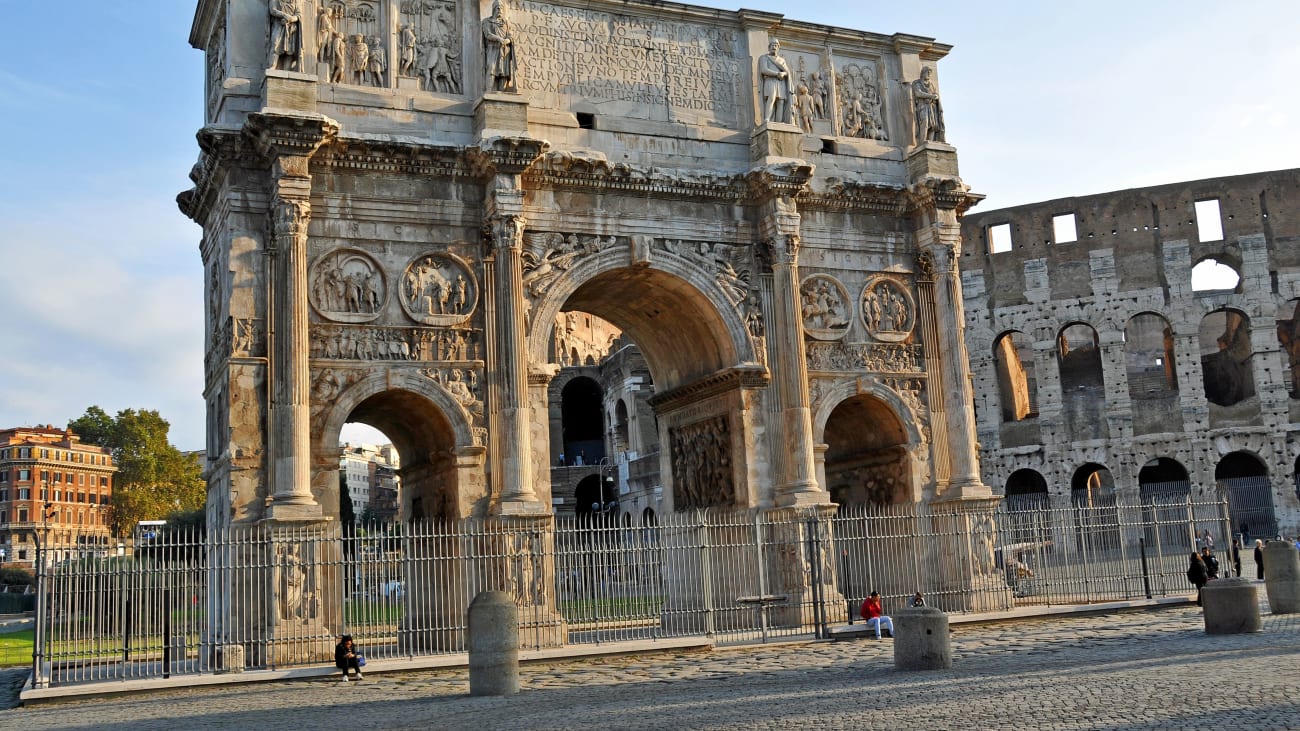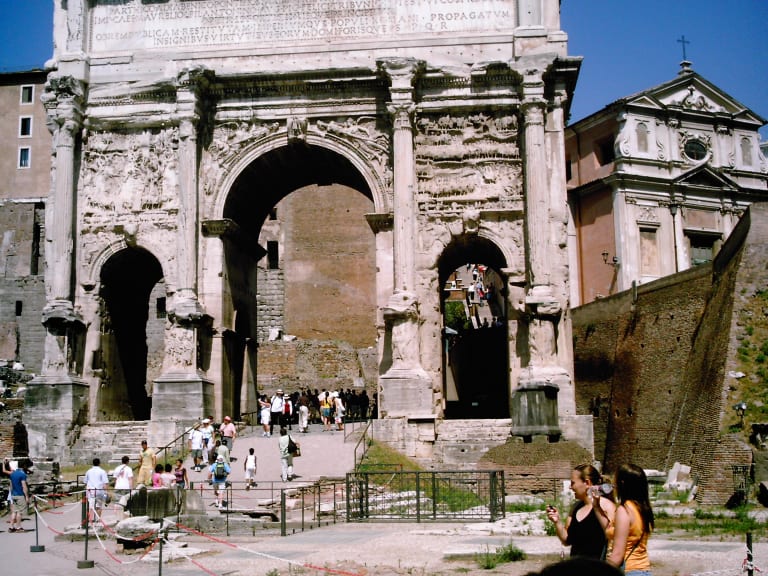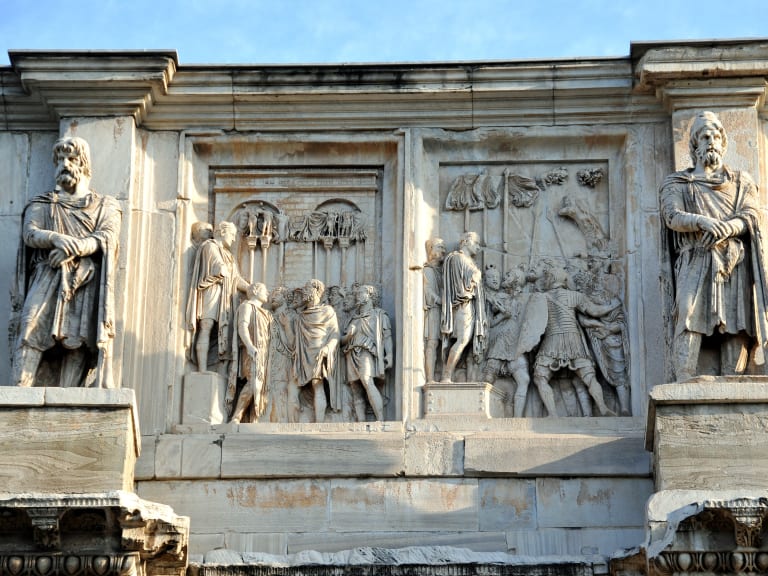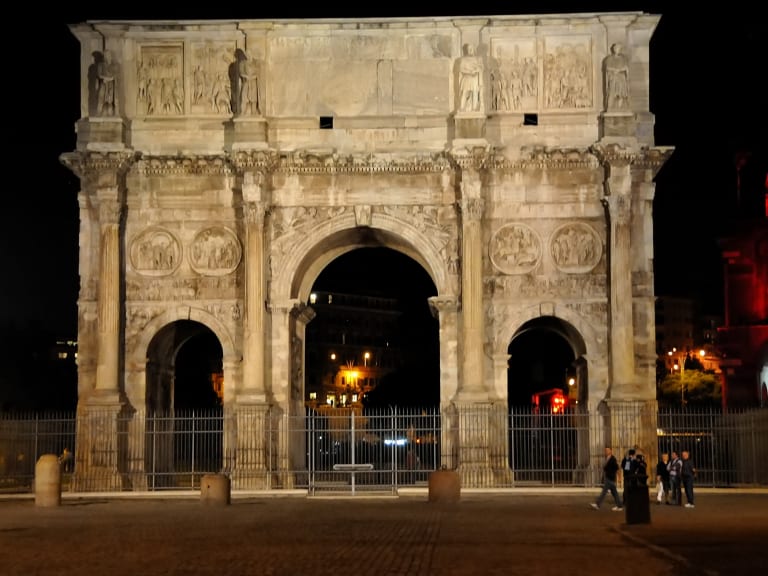Rome's Arc de Triomphe: everything you need to know
Rome's Arc de Triomphe was built to commemorate a victory of Constantine I and has been very well preserved, so you can visit it on your trip to Rome.

View of the Arc de Triomphe in Rome | ©Dennis Jarvis
Triumphal Arches were built in many European countries to commemorate military victories. In the Italian capital there are several, such as the Arch of Septimius Severus, the Arch of Titus and the Arch of Triumph in Rome. The latter, located next to the Roman Colosseum, is the one I would like to focus on.
The also known as the "Arch of Constantine" is one of the most modern Roman monuments (it was created in 315 AD) and both its location and its structure make it the most visited arch in Rome.
Guided tours of the Arc de Triomphe in Rome

In October 312, Emperor Constantine won the battle of the Milvian Bridge and, as was customary in Roman territory, a monument was built. The purpose of the Arch of Rome is to commemorate the victory of that occasion. This arch has many interesting facts that you will be told during a guided tour of the Colosseum and the Roman Forum. Some of them are:
- Many of the materials used in its construction came from other buildings and statues found in the city.
- All the images in the structure have the same context, namely Constantine's political plan to restore the empire.
- In the Middle Ages it was moved to a fortress that belonged to a family of Roman aristocrats.
- In 1804 it was painstakingly restored and returned to the site where it was originally built.
Guided tours mean that when you stand in front of it, you'll be able to see details that tourists on their own will ignore.
How much do tickets to Rome's Arc de Triomphe cost?

The Roman Triumphal Arch is located within the Archaeological Park of the Colosseum, but because it is on the public road you do not need to buy tickets to see it.
Unlike other arches found in Italy and other European countries, it is not possible to walk under the Arch of Constantine, as it is surrounded by protection. Even so, this does not prevent you from getting close enough to see the details of its design.
How to get to the Triumphal Arch of Constantine

The Arc de Triomphe is next to the Colosseum and there are several types of transport that have stops near the Arch of Constantine, specifically in Piazza del Colosseo. If you want to go to this monument, no matter where you are in the Italian capital, the ways to get there are:
- Bus: take line 51, 75, 81, 85, 87 or 118, all of which can take you to Piazza del Colosseo.
- Metro: the line you need to take is the B line, which takes you to the Colosseo stop.
In case you decide to use the last mentioned means of transport, it is advisable to read my guide to the Rome Metro.
Why visit Rome's Arc de Triomphe?

The Arch of Constantine is one of the most visited monuments in Rome. And the main reason why I encourage you to visit it is also for the architecture, as it is an impressive 21 metres high and 25 metres wide.
The middle arch is the largest and has reliefs of emperors and warriors all over the structure. Many centuries ago, people could pass underneath it, but not now. Obviously, the Arch of Constantine does not look the same as it did in the 3rd century, but it is still worth seeing.
Another reason why it is a great option to visit it is that it is located in a strategic point of the city. What do I mean? After visiting it you can visit the Colosseum, the Roman Forum and the Palatine Hill or the Arch of Titus.
Is it advisable to go to the Arc de Triomphe in Rome with children?

Yes, it is a monument that they are sure to enjoy seeing and be impressed by. Besides, they can walk safely in the area around the arch.
In case you want to do something on your holidays in the capital that is ideal for your children's ages I recommend you to read another of my articles in which I tell you 10 things to do in Rome for kids.
What to see at the Arc de Triomphe in Rome

The structure of the Arch of Constantine is made of various materials: marble for the lower parts and bricks and marble block details for the upper parts. The materials were reused because at the time it was built, the decadence in Rome was high and the end of the empire was near.
Although it was created in the 3rd century, the Arch of Constantine is very well preserved, thanks to the restorations that have been carried out on it.
Even today, seeing the Arch is still a great experience, so instead of visiting it quickly, I encourage you to spend a few minutes looking at the details.
Read the inscription on the Arch
On the face of Rome's Arc de Triomphe facing the Colosseum is an inscription, and what it says tells you a lot about the empire and the emperor Constantine. For example, the term "divinely inspired" is used , a reminder that Constantine, unlike other emperors, supported Christianity.
On the other hand, when reference was made to the people he defeated, he was not given a name, but was called "the tyrant". In this way, the idea was conveyed to the people that the war that was fought had been just. This inscription also makes it clear that it was the Senate that solemnly dedicated the Arch to Constantine.
As visitors are not allowed to walk under the monument, I would like to tell you about two inscriptions inside the largest arch:
- Liberator of the city.
- Founder of peace.
Be amazed by the accuracy of the reliefs and look at the statues
The reliefs on the outer walls of the monument are made of marble blocks. They are intended to narrate the wars and victories of the time of Hadrian, Marcus Aurelius, Trajan and Constantine (the main protagonist is the latter emperor).
Among the most outstanding reliefs are the following:
- Faces of emperors remodelled to look similar to Constantine.
- Marcus Aurelius giving bread to the poor.
- Roman soldiers in battle.
- Victorious marches.
As for the statues, they are in the upper area and represent Trajan after defeating the Dacians.
Look at the columns of the Arch

There are four Corinthian columns in the Arch. Before being installed in this monument, they were in another monument that was created in the 1st century and was lost over time. All the columns have as their bases sculptures representing winged victories in which one can see captives of Rome, Roman legionaries and palm fronds.
Not all the elements that are in this great arch are reused, some were made especially for this monument dedicated to Constantine. These represent the military acts of the emperor and can be seen in the following areas of the Arch:
- On the left side of the south façade: the siege of Verona.
- On the right side of the south façade: the battle with Maxentius.
- On the left side of the north façade: a scene in the Roman Forum.
- On the right side of the north façade: a gift-giving ceremony.
Take a look at Meta Sudans
Right in front of Rome's Arc de Triomphe are the remains of a monumental fountain that was in use until the 5th century. The structure was an impressive 18 metres high, had a cylindrical base and was covered in marble. It is said that gladiators came out of the Colosseum to refresh themselves in the fountain and clean their wounds.
Its diameter was about 16 metres and its depth was about one and a half metres. The last photographs of the Meta Sudans date from the 19th and 20th centuries, at which time it was only 9 metres high and no longer had its marble lining.
What was left of the monumental fountain was removed in 1936, and today only its remains remain. If you are interested in the subject, in another article I will tell you which are the 5 best fountains in Rome.
Tips for visiting the Arch of Constantine's Triumphal Arch

Rome's Arc de Triomphe is in one of the most visited areas of the city, so at peak times of the year it is possible for more than 3,000 visitors to arrive. So, if you are one of those people who like to admire a monument up close and see its details, I recommend you to go in the morning or late in the evening.
Many tourists and even people who live in Rome go to visit the Arc de Triomphe after dark. The reality is that there are several things you can do in Rome at night.
During those hours you can spend as much time as you like seeing the Arc and walking around to see other monuments in Rome. I hope you make the most of your trip to the Italian capital.
